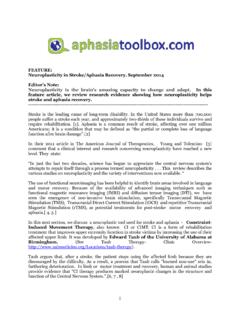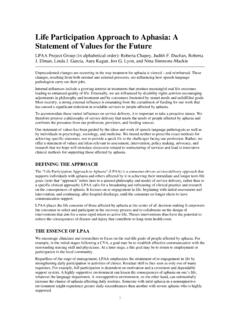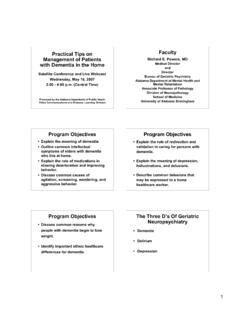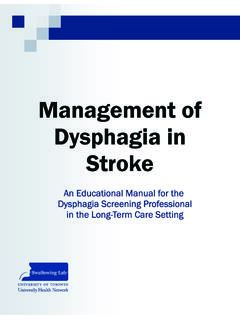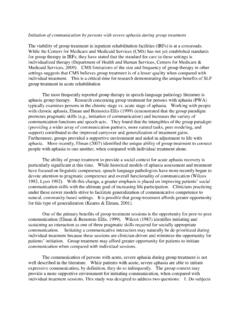Transcription of Improving support for patients with aphasia - nursingtimes.net
1 18 Nursing Times / Vol 110 No 25 / : Stroke/ aphasia /Language/Communication/Ho listic care This article has been double-blind peer reviewedNursing PracticeResearchCommunicationAuthors Juliana Thompson is graduate tutor; Margo McKeever is senior lecturer; both at Northumbria Thompson J, McKeever M (2014) Improving support for patients with aphasia . Nursing Times; 110: 25, communication is fundamental to holistic care and positive outcomes for patients affected by aphasia . However, when patients are unable to communicate verbally, the standard of nurse-patient interaction is often poor. In a summary of our recent discussion paper, we use the theory of human-scale development as a framework to discuss the impact of aphasia on health and wellbeing. We suggest strategies to improve nurse-patient communication and quality of life for patients with is the loss of the ability to understand or formulate language.
2 It is caused by brain dysfunction, most commonly as a result of stroke. People with aphasia may find it difficult to speak, read, write, remember words or understand what others have nurse-patient communication is central to clinical assessment, health pro-motion and patient autonomy. patients health outcomes are improved when nurses use communication to express con-cern and commitment and, in return, invite trust and human connection. Although communication involves verbal, non-verbal and graphic abilities, nurses communication strategies tend to focus on speech and do not always exploit alternative non-verbal methods. This results in an inability to engage effectively with patients affected by aphasia , which in turn leads to discrimination in stroke 5 key points 1 patients with aphasia experience problems in using language correctly 2 The most common cause of aphasia is stroke 3 The theory of human scale development proposes nine fundamental human needs4 Many of these needs are compromised if patients cannot communicate5 Nursing practice should take into account the impact of aphasia on patients lives services and poor long-term outcomes (O Halloran et al, 2008).
3 Theory of human scale developmentIf nurses are to use communication as a therapeutic tool, they must understand the devastating impact aphasia has on quality of life. According to the theory of human-scale development, quality of life depends upon the satisfaction of nine fun-damental human needs (Fig 1). Most of these needs are concerned with the psy-chological and social issues associated with the sense of self and relationships. If an activity involved in satisfying multiple needs (such as speech) is removed, the impact on life quality is devastating. patients with aphasia often complain that health professionals focus on physio-logical stroke events rather than aphasia experiences.
4 In an autobiographical account, a patient tells a health profes-sional: I have aphasia , only to be informed: You mean you had a stroke (Liechty and Heinzekehr, 2007). When health professionals focus on biomedical brain damage, they may neglect to recog-nise the psychosocial impact of of aphasia on the selfPeople require freedom and creativity to construct a sense of self (Rogers, 1967). Language is at the core of this construc-tion. Without language, this process becomes difficult, as the individual cannot inform the world who he or she is, or understand who others are. aphasia makes it difficult for the func-tional mind to be perceived by others.
5 This may lead to an assumption that language loss is the same as cognition loss or lack of In this The effect of aphasia on fundamental needs Effective communication strategies How to deliver compassionate careAphasia can put patients sense of self and relationship-building skills at risk. Nurses must recognise how aphasia affects patients whole lives to provide high-quality careImproving support for patients with / Vol 110 No 25 / Nursing Times 19approach is more psychologically healthy in such circumstances. Here, people are encouraged to accept their changed cir-cumstances, and create a different future. For the nurse, this involves using the patient s history as a source of interests on which new and modified goals can be built.
6 Impact of aphasia on relationshipsBerkman et al (2000) propose that relation-ships have significant influences on phys-ical and psychological health, providing informational, practical , decision-making and emotional support as well as opportu-nities for social engagement. All these are essential to participation and belonging, and affection and pleasure. Any process or condition that impedes communication also has the potential to damage relationships and cause social isola-tion. To reduce aphasia s impact on relation-ships, nurses must create environments that help patients meet fundamental human needs associated with relationship-building and social , effective communication allows patients to express their needs and prefer-ences and retain control over their quest approachAphasia traps people in the present because they are unable to talk about their past or express their hopes for the future.
7 They have lost their place in the world. Nystrom (2009) proposes that the best way for nurses to support patients to regain place is to use knowledge of their pre-stroke identities. An awareness of patients previous competencies allows nurses to personalise communication by basing subject matters on familiar con-texts. This enables patients to grasp mean-ings more easily and helps to provide a structure on which to base rehabilitation goals. However, this overlooks the fact that, for many patients , aphasia will remain permanent; preoccupation with the old self could therefore lead to mourning for what has been lost. Frank (1995) suggests that a quest capacity.
8 with capacity hidden, an indi-vidual is transformed from a person to a mere physical presence and often viewed as a burden with little social value. Nurses caring for people with aphasia control conversations and focus dialogue on their own nursing task goals, while patients rarely open discussions and have little influence over topics. This unbal-anced communication results in a further reduction of the self and a denial of patients rights to participate in their own care or control their own future. It is essential that nurses get to know the patient as a person, then empower that person to regain the creativity, confidence and freedom required to control their life. Use of familyWhere aphasia impedes direct verbal interaction between nurse and patient, family and friends can be a valuable source of information and immediate concerns are more easily interpreted when relatives are on hand to translate.
9 Knowledge of the patient s life and views equips family mem-bers to act as advocates. However, there are risks to patient autonomy if nurses heavily rely on family members. Any form of inter-pretation via a third person increases the chances of misinterpretation. This risk is further increased by relatives conscious or subconscious tendency to distort patients messages to address their own concerns. Shadden et al (2008) report that because disability caused by stroke has a significant negative impact on all close family mem-bers, relatives feelings of guilt, fear, stress and fatigue may filter out some of the true messages the patient is trying to express. Hedberg et al (2008) suggest that nurses require training in how best to involve rel-atives in decision making to ensure patients needs are properly understood.
10 CompetenceFinke et al (2008) propose that time and resources should be spent on Improving nurses competence in language practice therapy, for example through training in basic speech therapy, and augmentative and alternative communication such as gesturing, picture boards and electronic communication aids. Currently, few of these are used, possibly because special-ised communication techniques are con-sidered to be time consuming and beyond the remit of nurses. However, investing in them may lead to efficiency, because effec-tive interactions are less likely to result in misinterpretation and consequently frus-tration, time wasting and complaints. Fig 1. IMPACT of aphasia oN fUNdAMENTAl NEEds Nursing more articles on nursing older people.

